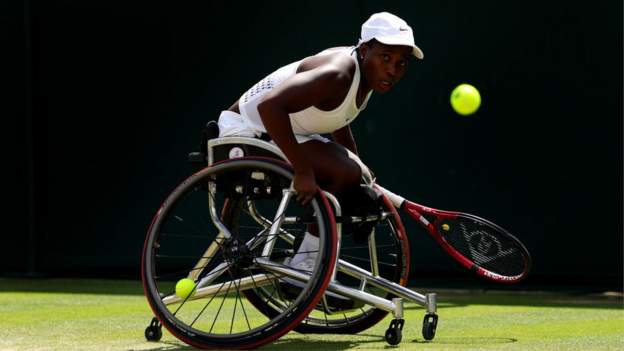
South Africa's Kgothatso Montjane has called on the International Tennis Federation to address the issue of representation.
Montjane and Japan's Yui Kamiji lost the Wimbledon women's wheelchair doubles final to the Netherlands' Diede de Groot and Jiske Griffioen.
Speaking to Newsday on the BBC World Service, Montjane felt that "maybe the ITF needs to push harder" on the issue.
She was the first black South African woman to compete at Wimbledon in 2018.
Montjane and Kamiji partnered for the first time this year at Roland Garros, winning the French Open women's wheelchair doubles title.
"I don't know if it's the issue of money; is it because we are poor? I don't know. I'm looking for the answers, I want to know why," Montjane said.
"I'm being told you're the first one so it's a bittersweet moment for me [winning the French Open].
"I want to celebrate, but at the same time I started late and I might be retiring soon. Who's next from Africa to do it?"
Montjane became the first South African woman to win a French Open title since Tanya Harford and Rosalyn Fairbank won the women's doubles in 1981, but believes there is enough talent on the continent.
"I really wish some fellow Africans can get an opportunity because I believe there's talent out there," said Montjane.
"I feel like I'm a beacon of hope somehow, because I'm doing it in a wheelchair. And when you look around, no-one is really doing it, apart from the lady from Tunisia [Ons Jabeur].
"As a black person, I'm just hoping people can see [what I'm doing] and invest more in black kids, so that we can see many more of us [doing it too]".
Funding issues despite ITF pathways
Andrew Moss, head of the ITF World Tour, told the BBC's Newsday that the matter is being addressed.
"There is talent on the continent that can break through into the top of the game; the elite game can come from anywhere," he said.
"And so the ITF has invested a lot of money both in development pathways, and also to help put on professional tournaments to help that happen."
Aside from the obvious motivation of winning another Grand Slam title, Montjane hopes her performances can inspire wheelchair tennis players, particularly black women back home.
Moss says that keeping people open to the idea of playing the sport beyond junior level is the key to success.
"We've seen a significant growth of tournaments across Africa. So that's kind of the main building block. What's then important is that there are opportunities for players after they stop being juniors, once they become 18, 19 years old," he said.
"I think if we have that pathway in place, then talent will naturally come out and then we can start working on where we can make it more affordable.
"But the more countries that host tournaments in Africa, obviously the better, which means that we can make sure that talent can come from anywhere."
Despite such positive words from Moss, Montjane remains adamant things must change.
"At the moment, funding is an issue but we do have a good base foundation when coming to wheelchair tennis. We used to host six ITF tournaments back in the days before we lost funding," she said.
"There's so much talent out there, just now people are staying at home because they can't travel due to the funding issue."
After success on the Roland Garros clay last month, Montjane wants Tennis South Africa to play their part too.
"This is just the moment for them to go knocking on doors to restore the sport," she said.
"This is the opportunity because we do have so much talent, so I hope they use this moment to go and knock on those corporate doors and look for more funding."















 Phone: (800) 737. 6040
Phone: (800) 737. 6040 Fax: (800) 825 5558
Fax: (800) 825 5558 Website:
Website:  Email:
Email: 






